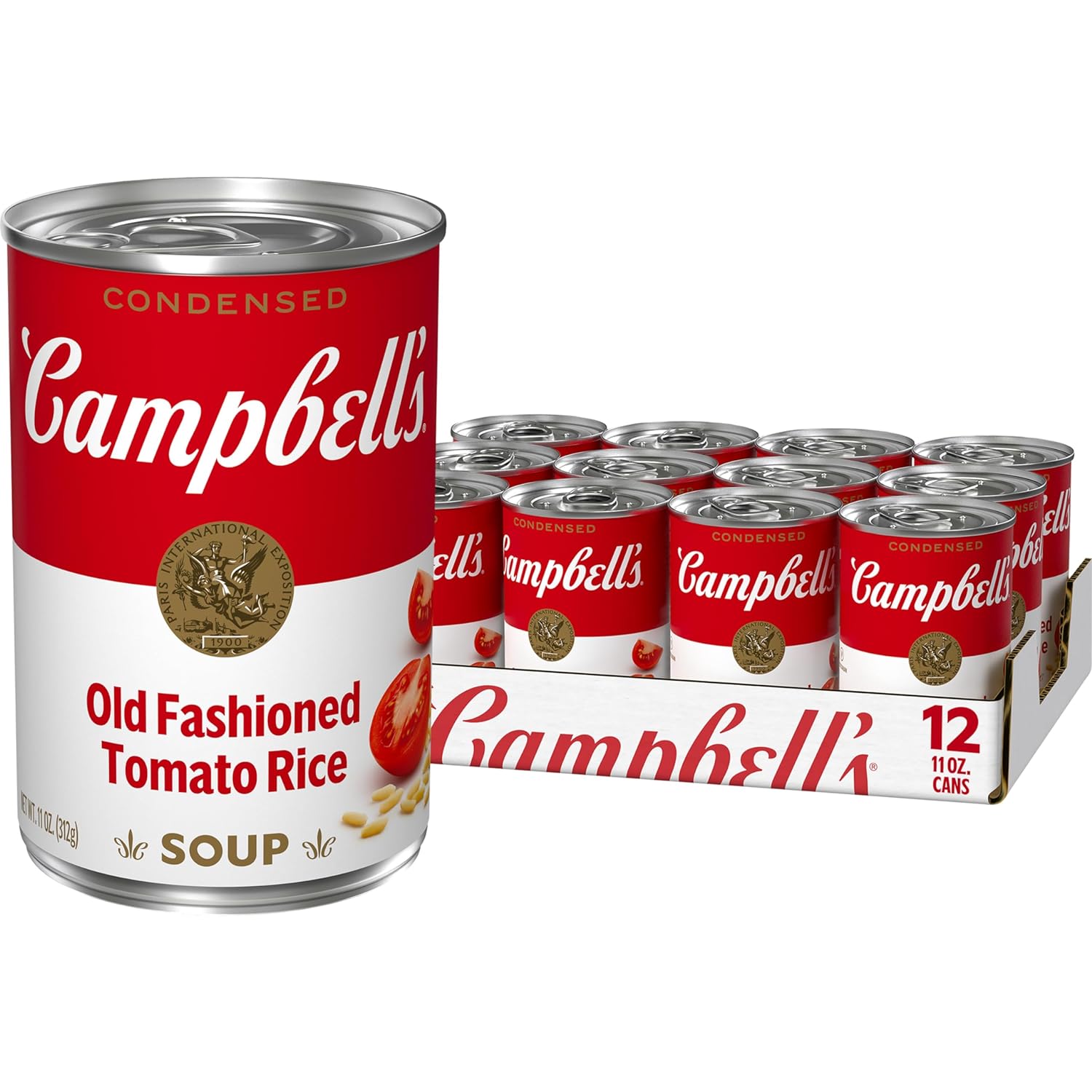The pictures in our articles might not always show exactly what the text is talking about. We use these images to make the article more interesting and eye-catching. They are there to add to the text, but not to replace it or show every detail.
When it comes to classic American comfort foods, Campbell's Soups are an iconic staple in pantries across the country. From savory Cream of Mushroom to hearty Chicken Noodle, these soups evoke nostalgic memories and warm our bellies. But have you ever taken a closer look at the nutrition facts label on that famous red and white can? Let's dive into everything you need to know about the ingredients and nutritional content of Campbell's Condensed Soups.
Breaking Down the Nutrition Facts
Using Campbell's classic Chicken Noodle Soup as an example, here's a breakdown of what you'll find on the label:
- Serving Size: 1/2 cup condensed soup (about 2.5 servings per can)
- Calories: 60 per serving
- Total Fat: 2g (3% DV)
- Saturated Fat: 0.5g (3% DV)
- Trans Fat: 0g
- Polyunsaturated Fat: 0g
- Monounsaturated Fat: 0.5g
- Cholesterol: 15mg (5% DV)
- Sodium: 890mg (39% DV)
- Total Carbohydrate: 8g (3% DV)
- Dietary Fiber: <1g (4% DV)
- Total Sugars: 0g
- Includes 0g Added Sugars (0% DV)
- Protein: 3g
- Vitamins & Minerals:
- Vitamin D: 0mcg (0% DV)
- Calcium: 10mg (0% DV)
- Iron: 0.6mg (4% DV)
- Potassium: 60mg (0% DV)
At first glance, a serving of Campbell's Chicken Noodle Soup looks relatively low in calories, fat, and sugar. However, there are a few key things to pay attention to:
- The serving size is 1/2 cup of condensed soup. Many people eat a whole can (which contains 2.5 servings) or add water, which doubles the volume. So it's important to multiply the nutrition facts accordingly if you're eating more than 1/2 cup condensed.
- The sodium content is quite high at 890mg per serving. That's nearly 40% of the recommended daily limit! Again, if you're eating a whole can, you could be getting over 2000mg of sodium in just one sitting. The American Heart Association recommends no more than 2300mg per day, with an ideal limit of 1500mg for most adults.
- While the soup contains some protein and a small amount of iron, it is not a significant source of vitamins, minerals, or fiber. The nutrition mainly comes from the chicken stock, noodles, and small amounts of chicken.
Ingredients in Campbell’s Chicken Noodle Soup
So what exactly is in this classic chicken soup? Here are the ingredients:
Chicken Stock, Enriched Egg Noodles (Wheat Flour, Eggs, Niacin, Ferrous Sulfate, Thiamine Mononitrate, Riboflavin, Folic Acid), Chicken Meat, Contains Less Than 2% Of: Salt, Chicken Fat, Water, Monosodium Glutamate, Cornstarch, Modified Cornstarch, Natural Flavoring, Dried Chicken Broth, Sugar, Beta Carotene For Color, Onion Powder, Soy Protein Isolate, Sodium Phosphate, Yeast Extract, Dried Chicken, Garlic Extract.
A few key things to note about the ingredients:
- Chicken stock and chicken meat are the main components. However, the chicken meat makes up less than 2% of the soup. Most of the flavor comes from the stock, salt, and MSG.
- The noodles contain enriched wheat flour. While this adds some B vitamins and iron, it also means this soup is not gluten-free or grain-free.
- There are multiple sources of sodium, including salt, monosodium glutamate (MSG), soy protein isolate, and sodium phosphate. This is how a small 1/2 cup serving can pack in 39% of your daily sodium allowance.
- Other additives and preservatives include cornstarch, yeast extract, beta carotene for color, and "natural flavoring" which is an umbrella term that could include a wide variety of ingredients.
Comparing Different Campbell’s Soup Varieties
Of course, not all Campbell's Soups have the exact same nutrition facts and ingredients. Some key differences to note:
- Calories: While Chicken Noodle has 60 calories per serving, other varieties like Classic Tomato have 90 calories per 1/2 cup serving. Cream-based soups like Cream of Mushroom are even higher at 100 calories per 1/2 cup.
- Fat: Chicken Noodle is relatively low in fat with 2g per serving. However, cream-based soups can have 7-8g fat per 1/2 cup, with 1.5-2.5g being saturated fat.
- Sodium: Nearly all Campbell's Condensed Soups are high in sodium, ranging from 30-40% of your daily value per 1/2 cup serving. Some "Healthy Request" versions have 25-30% less sodium, but they're still high overall.
- Protein: Chicken Noodle, Vegetable Beef, and other meat-containing soups have around 3-4g protein per serving. Vegetarian varieties like Tomato or Cream of Mushroom only have 1g protein per 1/2 cup.
The Bottom Line: Is Campbell’s Soup Healthy?
As with most packaged, processed foods, Campbell's Soups can have a place in a balanced diet, but they shouldn't be relied upon as a major source of nutrition.
Some potential benefits of incorporating these soups include:
- Convenience: They are shelf-stable and easy to prepare quickly.
- Comfort: Many people find them satisfying and nostalgic.
- Versatility: They can be used as a base for recipes like casseroles, pot pies, etc.
However, there are also some drawbacks to consider:
- High sodium content, which may contribute to high blood pressure and heart disease if consumed in excess
- Relatively low in nutrients like vitamins, minerals, fiber, and protein
- Often high in saturated fat, especially cream-based varieties
- Contains processed ingredients and additives like MSG, modified cornstarch, soy protein isolate, etc. which some people prefer to avoid
If you enjoy Campbell's Soups, here are some tips to make them fit into a healthy lifestyle:
- Practice portion control. Stick to the 1/2 cup serving size, or if you eat the whole can, balance it out with lower-sodium foods the rest of the day.
- Use them as an ingredient, not the main event. Adding veggies, protein, and whole grains can make canned soup into a more complete, nutritious meal.
- Compare nutrition labels and choose wisely. Opt for lower-fat and lower-sodium varieties when possible. You can also get "unsalted" versions of some cream soups and add your own salt to control the sodium.
- Balance them with plenty of whole, unprocessed foods. Enjoy Campbell's Soups as an occasional convenience, but make sure the majority of your diet consists of nutrient-dense whole foods like vegetables, fruits, whole grains, lean proteins, and healthy fats.
Condensed soups like Campbell's certainly have a nostalgic place in American cuisine. While they are not considered a health food per se due to their high sodium content and minor presence of other essential nutrients, they can still be incorporated in a balanced, varied eating pattern. As with any food, moderation and awareness are key for maintaining a nutritious, sustainable lifestyle.






